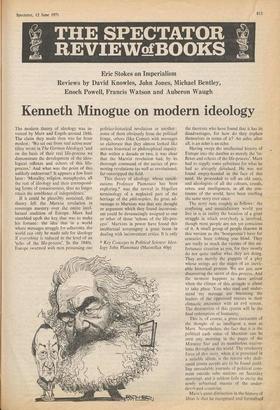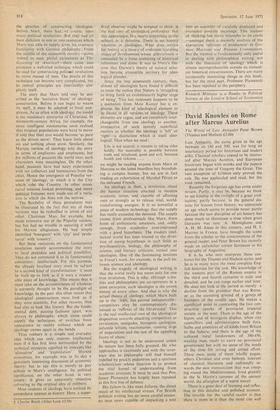m ( i7 THE SPECTATOR
REVIEWaBOOKS
Eric Stokes on Imperialism Reviews by David Knowles, John Jones, Michael Bentley, Enoch Powell, Francis Watson and Auberon Waugh
Kenneth Minogue on modern ideology
The modern theory of ideology was in- vented by Marx and Engels around 1846. The claim they made then was far from modest : 'We set out from real active men' (they wrote in The German Ideology) 'and on the basis of their real life-process we demonstrate the development of the ideo- logical reflexes and echoes of this life- process.' And what was the point of this unlikely endeavour? It appears a few lines later: 'Morality, religion, metaphysics, all the rest of ideology and their correspond- ing forms of consciousness, thus no longer retain the semblance of independence.'
if it could be plausibly sustained, this theory left the Marxist revelation in sovereign mastery over the entire intel- lectual tradition of Europe. Marx had stumbled upoh the key that was to make his fortune: the idea that in a world where messages struggle for adherents. the world can only be made safe for ideology if everything is reduced to the level of an 'echo of the life-process'. In the 1840s, Europe swarmed with men possessing one politico-historical revelation or another: some of them obviously from the political fringe, others (like Comte) with messages so elaborate that they almost looked like serious historical or philosophical inquiry. But within a decade or two, it was clear that the Marxist revelation had, by its thorough command of the tactics of pro- moting revelations (as well as revolutions), far outstripped the field.
This theory of ideology, whose ramifi- cations Professor Plamenatz has been exploring,* was the revival in Hegelian terminology of a neglected part of the heritage of the philosopher. Its great ad- vantage to Marxists was that any thought or argument which they found inconveni- ent could be devastatingly assigned to one or other of those 'echoes of the life-pro- cess'. Marxists in power have found this intellectual sovereignty a great boon in dealing with inconvenient critics. It is only * Key Concepts in Political Science: ideo- logy John Plamenatz (Macmillan 60p) the theorists who have found that it has its disadvantages, for how do they explain themselves in terms of it? An echo, after all, is an echo is an echo.
Having swept the intellectual history of Europe into the dustbin as merely the 're- flexes and echoes of the life-process', Marx had to supply some substitute for what he had so abruptly de:Valued. He was not found empty-handed in the face of this need. He proceeded to tell an old story, and ideologists of all the colours, creeds, sexes, and intelligences, in all the con- tinents of the world, have been retelling the same story ever since.
The story runs roughly as follows: the confusing and unsatisfactory world you live in is in reality the location of a great struggle in which everybody is involved, though most people are not yet conscious of it. A small group of people (known in this version as the 'bourgeoisie') have for centuries been robbing you blind. They are really as much the victims of this un- fortunate situation as you, for they mostly do not quite realise what they are doing. They are merely the puppets of a play whose strings are the stages of an inevit- able historical process. We are just now discovering the secret of this process. And the moment happens to have arrived when the climax of this struggle is about to take place. You who read and under- stand my message are becoming the leaders of the oppressed masses in their climactic encounter with an evil system. The destruction of this system will be the final redemption of humanity: This is. of course, a gross caricature of the thought of so intelligent a man as Marx. Nevertheless, the fact that it is the political cash value of Marxism can be seen any morning in the pages of the Morning Star and its numberless equiva- lents throughout the world. The revelatory force of this story, when it is presented in a suitable idiom. is the reason why dedi- cated young people are to be found pedd- ling unreadable journals of political com- ment outside tube stations on Saturday mornings. and it seldom fails to excite the newly urbanised masses of the under- developed countries.
Marx's great distinction in the history of ideas is that he recognised and formalised
the practice of constructing ideologies. Before Marx, there had, of course, been many political revelations. But they had all been deficient in one or two resources which Marx was able to supply from his extensive familiarity with German philosophy. From the middle of the nineteenth century—down indeed to such pitiful caricatures as The Greening of Americaf—there came into existence a well-tried technique which could be used for constructing political revelations to move masses of men. The details of this technique can become very complicated, but its central principles are (inevitably) sim- plicity itself.
The story that Marx told may be des- cribed as the 'narrative blank' of ideology- construction. Before it can begin to weave its spell, it must be adapted to local con- ditions. As so often with ideology, the model is the missionary enterprise of Christians. In nineteenth-century Africa, for example, the more intelligent missionaries soon realised that tropical populations were hard to move if told that their sins would become 'as pure as the driven snow'. They knew little about .
sin and nothing about snow. Similarly, the Marxist version of ideology told the story in terms of employers and employees; but for millions of peasants the world over, such characters were meaningless. On the other hand, peasants have had nasty experiences with tax collectors and bureaucrats from the cities. Hence the emergence of Populist ver- sions of ideology, in which it is the City which robs the Country. In other areas, racial tensions looked promising, and many political fortunes were made out of a varia- tion in which the Jews rob the natives.
The flexibility of these procedures may be illustrated by the fact that any of these versions may be reshuffled in terms of any other. Chairman Mao, for example, has made extensive use of the Populist version, but has had no trouble in squarifig it with his Marxist allegiances. He had simply identified 'bourgeois' with 'city' and 'prole- tariat' with 'country'.
But these variations on the fundamental revelation merely accommodate the story to local prejudice and political possibility. They do not commend it to its fundamental consumers: intellectuals. For this purpose, the already localised story must be subject to a second kind of transformation : it must be built up to look as if it were a respect- able piece of knowledge. This means that it must take on the accoutrements of whatever is currently thought to be the paradigm of knowledge. In the past. this often meant that ideological constructions must look as if they were scientific. For other reasons, they had also to look like history. But the funda- mental debt, passing fashions apart, was always to philokophy. which alone could supply the techniques of switches from appearance to reality without which an ideology comes apart in the hands.
Thus robbery is a simple and everyday idea which can only impress intellectual men if it has first been surrounded by the technical mysteries signified by concepts like 'alienation' and 'exploitation'. Marxist economics, for example, was in its day a genuinely interesting discussion of ecorfomic theory; but to say this is merely to pay tribute to Marx's intelligence. Its political significance, on the other hand. is very simple: it gives- an apparently objective colouring to the original idea of robbery.
Most students of ideology have noticed its compulsive interest in history. Here, a super- t Charles Reich (Allen Lane £2.50) ficial observer might be tempted to think, is the real core of ideological profundity. But this appearance, like nearly everything in the subject, is a delusion. There is no history whatever in ideologies. What does service for history is a theory of evolution featuring stages of development whose arbitrariness is concealed by a loose scattering of historical references and dates. It was in Marx's life- time that Darwin's theory of natural selec- tion became irresistible territory for ideo- logical plunder.
Since the late nineteenth century, then, almost all ideologists have found it difficult to resist the notion that Nature is 'struggling to bring forth an evolutionarily higher stage of being'. This last statement happens to be a quotation from Mein Kampf but it ex- presses the kind of teleological element to be found in all versions of ideology. These elements are vague, and are completely inter- changeable from one ideology to another, irrespective of such entirely superficial matters as whether the ideology is 'left' or `right'—a distinction which is itself ideo-. logical. Thus when we read :
Life is not neutral; it consists in taking sides boldly. No neutrality is possible between truth and falsehood, good and evil, between health and sickness . . .
we might be reading anyone from Marx or Marcuse to the latest beardless boy brandish- ing a campus banner, but we are in fact reading an exhortation of Marshal Main to the defeated French.
An ideology is. then, a revelation about the human situation couched in modern academic terms, and capable of affecting men so strongly as to release vital, world- transforming energies. It is so powerful a . piece of modern technology that the supply has vastly exceeded the demand. The supply comes from professionals like Marx, from hosts of enthusiastic amateurs, and. oddly enough, from academics over-impressed with a good hypothesis. The modern intel- lectual world has been treated to the diver- sion of seeing hypotheses in such fields as psychoanalysis, biology, the philosophy of science. and literary criticism, turned into ideologies. One of the fascinating tensions in Freud's work, for example, is the pull be- tween science and ideology.
But the tragedy of ideological writing is that the world really has room only for one true revelation. This is why, although scien- tists and philosophers are co-operators in a joint enterprise, each ideologist is the sworn enemy of every other. And that is why the actual theory of ideology, which Marx built up in the :84,0s, has proved indispensable: competitors may be contemptuously dis- missed as 'reflexes of the life-process'. This is the real intellectual root of the ideological disposition towards attacking competitors as revisionists, renegades. bourgeois apologists, infantile leftists, reactionaries. running dogs of imperialism and the rest of the appalling litany of abuse.
Ideology is not to be understood unless its nature has been fully grasped. He who approaches it cautiously and with the rever- enpe due to philosophy will find himself repelled by prickly pedantries and a spurious scholasticism whose function is to protect the vital kernel of understanding from academic criticism. It must be said that Pro- fessor Plamenatz has largely been repulsed at this first line of defence.
His failure is. like most failures. the direct result of his intellectual virtues. For British political writing has no more careful reader, no man more capable of unpacking a text
into an assembly of carefully displayed and evaluated possible meanings. This manner of thinking has many triumphs to its credit —amongst them a masterly analysis of the expression 'relations of production' in Ger- man Marxism and Russian Communism. But the method is fundamentally only useful in dealing with philosophical writing, not with the literature of ideology which is almost incomprehensible outside its immedi- ate historical circumstances. There are many incidentally interesting things in this book; but for the most part, Professor Plamenatz has been repulsed at the periphery.
Kenneth Minogue is a Reader in PolitiCal Science at the London School of Economics



































 Previous page
Previous page